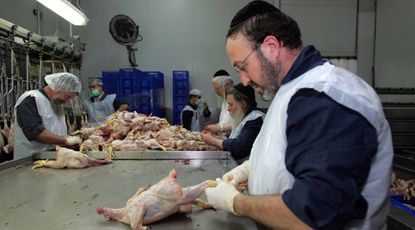The European Court of Justice (CJEU) issued on Thursday a ruling in favour of the Flemish ban of ritual slaughter.
The ban contradicts a previous opinion of its Advocate General who had recognized that the banning is an attack on the rights of Belgian citizens to practice their religions freely and is incompatible with EU law.
- The Kano-Maradi rail line: Impunity and indulgence as driving force
- Kogi monarch promises to empower traditional rulers’ wives
The Advocate General’s opinion is followed in the majority of cases and the ruling came as surprise to the Jewish and Muslim organisations in Belgium who had filed a common appeal to the CJEU to overrule the ban in the name of freedom of religion. According to the applicants, ritual slaughter is also compatible with animal welfare concerns.
The bans on ritual slaughter in Belgium were proposed some years ago. Following the court decision, Flemish minister Ben Weyts (N-VA), who as minister for animal welfare introduced the ban in 2017, celebrated the ruling as a victory and tweeted that, “We are making history today.” In his view, the ruling opens the door to forbid ritual slaughter without stunning throughout Europe.
The minister did in the past not respond to repeated requests for comments from The Brussels Times.
In fact, the relevant EU regulation (No 1099/2009 on the protection of animals at the time of killing), does allow ritual slaughter without stunning if it takes place in approved slaughterhouses.
This was already permitted in an earlier EU directive.
European Commission Executive Vice-President Frans Timmermans said in 2017 that according to his personal point of view, “ritual slaughter should not be a problem if it is done by people trained to do so.” He added that “on animal welfare, let the facts speak for themselves. Let science testify as to the suffering of animals when they are slaughtered.”

 Join Daily Trust WhatsApp Community For Quick Access To News and Happenings Around You.
Join Daily Trust WhatsApp Community For Quick Access To News and Happenings Around You.

